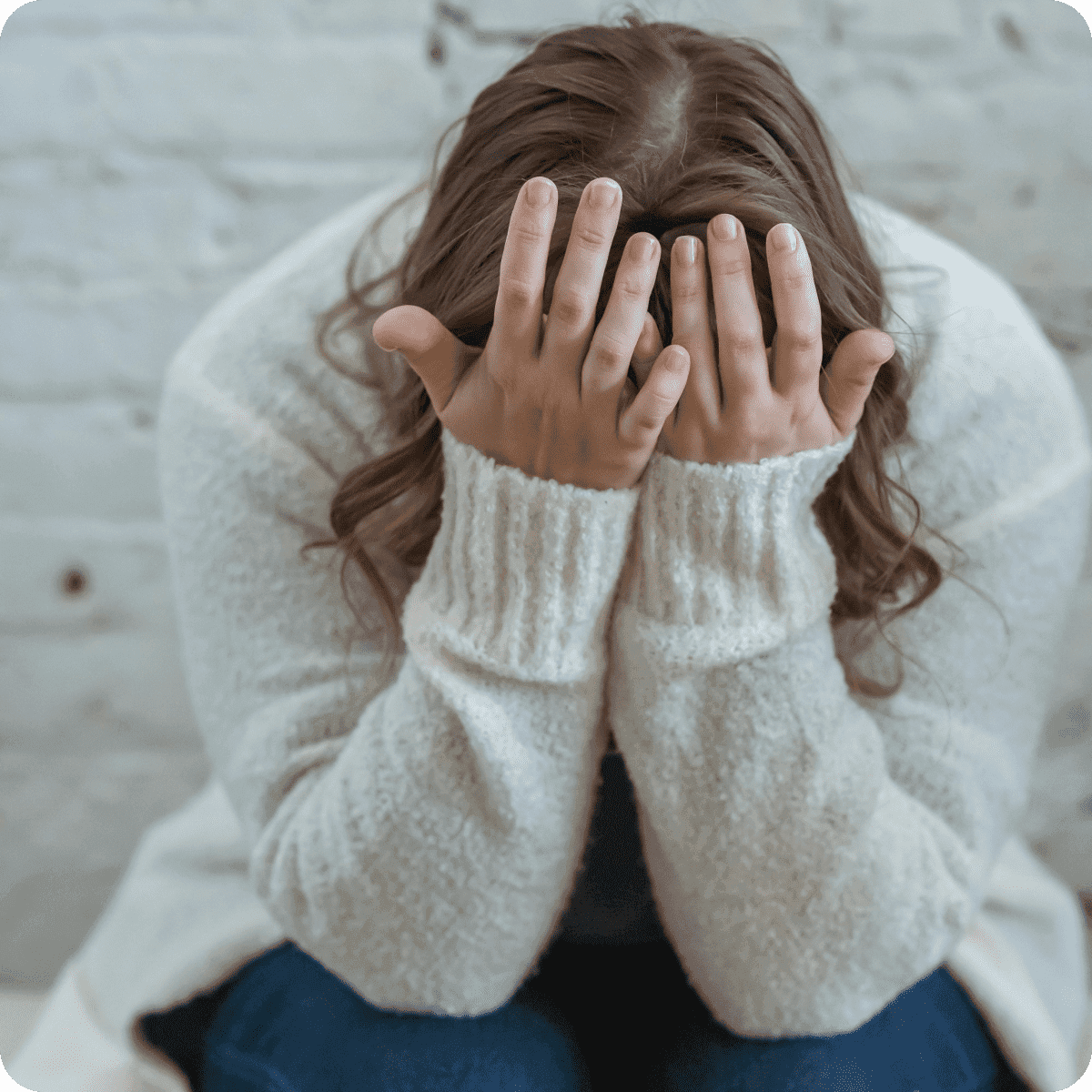Migraines are a common and disabling condition, affecting up to 40% of women in their lifetime. Did you know that they are 2-3 times more common in women than in men?
There are lots of different types of migraines (like hormonal and menstrual) and they may be triggered by hormonal changes. Hormonal or menstrual migraines are associated with periods, usually occurring just before or during a period. Unfortunately, these can last longer, be more severe and less responsive to conventional treatment than other forms of migraine.
Hormonal and menstrual migraines often develop during puberty and worsen during perimenopause, likely due to the extreme fluctuations in oestrogen levels and/or progesterone levels at this time. Prostaglandins released from the womb during a period may also contribute.
The good news is that two-thirds of hormonal migraines improve after menopause.
Keep reading to learn how to manage these migraines when they’re at their worst.
Does menopause cause headaches and migraines?
Most people will have had a headache at some point in their lives, and unfortunately, some will suffer from migraines too. Fluctuating hormone levels can trigger a range of menopause symptoms, including headaches and migraines, and cause them to increase in intensity and frequency too.
It’s not entirely understood why changes to hormones, and particularly oestrogen, bring on headaches and migraines during menopause. Some research indicates that it is because oestrogen increases your sensitivity to pain. Other literature theorises that menopausal headaches and migraines are a result of oestrogen causing blood vessel contractions in the head which result in pressure changes.
What does a menopause headache feel like?
During menopause, you may experience head pressure and pain including tension headaches, migraines, and sinus headaches. Each type of headache has distinct symptoms, though they may overlap. Here’s a breakdown of their symptoms:
Tension headache
While not believed to be hormone-related, tension headaches can be caused by stress and muscle tension. Navigating menopause symptoms can be a stressful time so it’s not uncommon for tension headaches to occur.
A tension headache can feel like you have a tight rubber band around your head, often affecting the forehead, temples, and back of the head. You may also experience muscle tension in the neck and shoulders.
The pain can be mild to moderate and can create a dull ache or a sensation of pressure. Tension headaches usually last from 30 minutes to a few hours but can last for longer.
Migraine
Migraines are normally more severe and debilitating than tension headaches. They usually affect one side of the head or behind the eye but can sometimes occur in both. The pain is described as a throbbing or pulsing, that becomes worse with physical activity and can last from four hours to a few days if left untreated. Migraines can cause other symptoms including:
- Sensitivity to light (photophobia)
- Sensitivity to sound (phonophobia)
- Aura: Some people experience visual, sensory or motor disturbances such as flashing lights or blind spots, muscle weakness, or ringing in their ears
- Tingling in the hands and face before the headache starts
- Nausea and vomiting
- Dizziness or vertigo
- Lightheadedness
After a migraine, there is a stage known as postdrome, the symptoms of which can feel like an alcohol-induced hangover. You may be fatigued, have trouble focusing and have lingering neck stiffness.
Sinus headache
Falling oestrogen levels can affect the mucous membranes, drying your sinuses out and making you more prone to sinus issues.
Sinus headaches are usually centred around the forehead, cheeks and nose. They are characterised by a constant deep pressure or pain that can extend behind the eyes and last for days without treatment. Other symptoms of sinus headaches include:
- Congestion or stuffy nose
- Postnasal drip (mucus in the back of the throat)
- Facial tenderness or swelling
- Mild sensitivity to light
- Altered sense of smell
How to treat menopause headaches and migraine
Some people will be able to successfully alleviate a menopause headache or migraine with over-the-counter painkillers, such as ibuprofen or paracetamol. However, other treatments and actions can help you to manage them:
- Acute medications: Headaches and migraines can be treated at the onset with prescribed medications including non-steroidal anti-inflammatory drugs (NSAIDs), triptans, and gepants.
- Preventative medications: If prone to frequent headaches or migraines, a preventative medication regimen can help manage them. Preventive medications include calcium channel blockers, beta-blockers, anticonvulsants, and antidepressants.
- Combining pain relief with caffeine: This has been found to help treat a migraine attack for some women, although caffeine can be a trigger for others.
- Lifestyle changes: Maintaining a healthy lifestyle can help manage migraines. Eat a balanced diet, keep a good sleep routine, drink plenty of water and engage in regular physical activity.
- Stress management: Stress is a common trigger for migraines. Deep breathing techniques, aromatherapy, acupuncture and massage can all help you to relax.
- Biofeedback: Biofeedback is a technique that helps individuals gain control over certain physiological functions that are usually involuntary, such as heart rate, muscle tension, and skin temperature. For managing menopause-related migraines, biofeedback can be a valuable tool, especially when used alongside other treatments.
Is keeping a headache diary useful?
Keeping a headache diary for a few weeks or months may help to determine potential triggers, including a link to your periods. It can be useful to keep track of migraines in relation to sleep patterns, water intake, specific foods, alcohol, caffeine, stress, emotion, exercise and medications, as well as periods.
Will HRT help with headaches?
At Menopause Care, we use Hormone Replacement Therapy (HRT) to treat perimenopausal symptoms, and also to treat migraines. HRT works by smoothing out the extreme fluctuations in hormone levels.
HRT in the form of transdermal oestrogen (oestrogen given through the skin) can be used in people who suffer from migraines with and without aura. We usually start at a low dose and gradually increase this. HRT may make headaches worse in some people, but it may improve the frequency and severity of headaches in others. Starting and increasing oestrogen may also initially trigger migraine episodes, but these usually settle fairly quickly.
Oestrogen patches provide a consistent level of oestrogen so women with migraines often prefer these, but you can also use oestrogen gel (Oestrogel, Sandrena) and spray (Lenzetto).
Alongside oestrogen, it's important to use progesterone to protect the lining of the womb (unless you've had a hysterectomy). In perimenopause, when you're still having periods, we sometimes suggest a Mirena coil as the progesterone component of HRT, as it gives a steady level of hormone release, has minimal systemic absorption, and may stop periods altogether. Micronised progesterone (Utrogestan) is also commonly used as the progesterone component of HRT in women with migraines and is usually well tolerated.
A low-dose combined oral contraceptive pill can be used for some perimenopausal women who suffer from migraines without aura (but not those with aura). We avoid the combined oral contraceptive pill or oral HRT if you're experiencing migraines with aura due to an increased risk of stroke.
Can supplements help with headaches?
Some people choose to take supplements such as Vitamin B2 and magnesium to help with migraines. As everyone is different, some women find these more effective than others.
Vitamin B2 (riboflavin) is essential for energy metabolism in cells. Some research suggests that migraines may be linked to mitochondrial dysfunction (problems with how cells produce energy), and riboflavin helps improve this process.
Magnesium plays a crucial role in maintaining normal nerve function, muscle relaxation, and blood vessel tone. There is evidence to suggest that low levels of magnesium can trigger headaches and therefore, taking magnesium may help. As a supplement, it’s generally well tolerated but can cause stomach upset in some people.
Do complementary therapies help with menopause migraines?
Complementary therapies can help manage menopause-related migraines, often working alongside traditional treatments to reduce the frequency, intensity, or duration of headaches.
Acupuncture, for example, involves inserting thin needles into specific points on the body to stimulate nerves and muscles. This ancient practice is thought to release endorphins (natural painkillers) and promote blood flow, which can help reduce migraine frequency and intensity. It may also help with other menopause symptoms like hot flashes and joint pain.
Yoga for menopause is also beneficial, not only for reducing stress but also for managing other symptoms. It combines physical postures, breathing techniques, and meditation, which can help reduce stress, tension, and anxiety – all common migraine triggers.
Massage therapy can help relax muscles, improve blood flow, and reduce stress. For menopause migraines, massage may help by easing tension in the neck and shoulders, reducing headache frequency, and promoting relaxation. This can also help with sleep quality, which is commonly impacted by hormone changes during menopause.
When to see a doctor for menopause headaches and migraines
If you’re experiencing menopause headaches everyday or frequent migraines that are affecting your day-to-day life, it may be a good idea to talk to a professional.
As people’s experience of perimenopause, menopause and migraines is so varied, it’s important to assess each person and their history individually. We use this individualised approach here at Menopause Care which enables us to best manage your menopausal symptoms and migraines.
Knowing which doctor to consult for your menopause symptoms will ensure you get the best support. Dr Kate Lethaby is our lead clinician and Dr Hannah Short specialises in migraines, but all our doctors are experienced in managing this symptom. If you’re struggling with hormonal headaches in menopause, book a consultation to find out how we can help.





